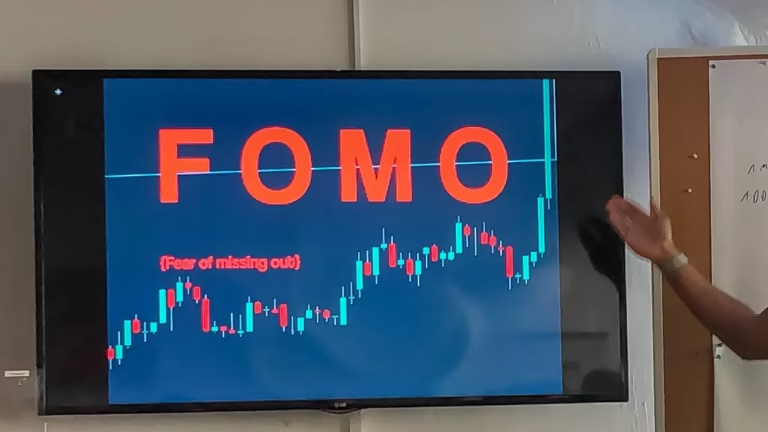The way we’re taught is ancient and not suitable for modern times
If I look around and ask myself why so many people are struggling when it comes to the topic of money and what to do with it, I come to the conclusion it has to do with the way we are taught.
In January 2020, well before the current health crisis, a survey was conducted to ask Americans if they could afford to pay for a $1000 financial emergency. 59% responded that they don’t have sufficient savings to pay for such an emergency, and that’s not even taking into account that a typical emergency, like a car accident or a medical bill, is usually more around $3500.
It’s not that we’re not interested in saving money. In fact, in a study conducted in 2019, 65% of the participants responded that they want to save more.
So, in a nutshell, we don’t save but we want to save. Why is that?
One reason, in my view, is found in the way we receive and react to information. When we are young, our parents raise us and tell us what to do. Often we don’t want to believe or admit that they have a lot of influence on our behaviors but they do.
As I grow older, I’m still surprised at how often I catch myself saying things my parents used to say. It’s much harder than we think to create our own path, our own beliefs, and our own approach to daily life’s issues.
Most people believe their parents didn’t have any bad intentions when teaching them how to deal with life and become an adult. So why do we behave in ways that don’t help us get ahead when it comes to money?
All-day long our brain makes decisions for us that impact our life
Our brains help us handle the enormous amount of data stimulating our senses at any given moment by selecting what we should pay attention to, what we should disregard, and what can be taken care of by automation.
Imagine this: you’re in a room with people, properly socially distancing, and you’re having a conversation with a stranger. Your brain tunes into what that person is saying so you can correctly understand them and tunes out everything else irrelevant to the conversation. While this is happening, people walk by.
It’s been your life long dream to meet Jennifer Lawrence. Later on that evening you meet a friend while getting a glass of water. He asks with excitement: “Did you see Jennifer Lawrence walking by right where you were standing? She was talking to a ton of people! I didn’t know she engages with her fans like that.”
You feel like you’ve been hit by a truck. Your brain knew how much you love Jennifer Lawrence and would give almost anything for a chance to meet her, let alone speak to her… But since you wanted to focus on your conversation with the stranger, it helped you do just that and decided not to switch your focus to Jennifer Lawrence as she was approaching.
That’s the reason fire alarms have extra loud noisemakers/horns/speakers and flashing lights. They force your attention by pulling your brain out of what it’s doing with something it can’t ignore.
The media influenced our parents — stuff is not a sign of success
All this selecting, focusing, and tuning in is happening through your personal automation, and this personal automation included listening to your parents while growing up.
The only problem was that our parents were influenced by the media and the media was telling them what to believe.
A source’s credibility is also a contributing factor to this phenomenon. If we get information of any kind, we pre-select by credibility. We are much less skeptical about what people we know and trust have to say and their words generally have a bigger impact on us than words coming from a stranger.
When a huge news outlet on TV or a well-known newspaper makes public statements we tend to believe it. When a government official keeps repeating something that he or she declares to be the truth, we are much more likely to believe it. It’s called the illusory truth effect.
Through the media, all generations after WWII were told the gospel of consumerism: everyone should accumulate as much stuff as possible, and the more stuff you own, the more successful and better person you supposedly are.
Credit cards were invented when the regular income people were earning wasn’t enough to buy stuff anymore. Credit cards allowed us to spend more than we actually have coming in. To make it look like we can afford it, the credit card statement is based on a calculation where we only have to make a very small minimum payment for the stuff we bought.
Usually, this calculation is based on a repayment term of 30 years. Yes, that toaster oven or movie ticket you bought is repaid on your credit card over 30 years with an interest rate of 100x the regular bank savings rate. That’s why it’s only $12/month.
The latest trick people do is to get a bunch of cards, max them all out and ultimately consolidate their debt into a single loan to make room for more debt they can put on their cards.
Why do we do such foolish things? Because we’ve been raised to believe that getting more stuff makes us better people who will be seen as more successful in society.
Why We Know Shit About Money — The Scientific Method Keeps Us Dumb

You could say that maybe your parents taught you the wrong things or fell for the consumerism myth saying that it makes people happy… but when you go to school, and ultimately to college, things get much better right?
Nope, not really. By that time, we usually become too lazy to challenge the way we are taught, and the only approach to learning applied in almost all educational institutions is based on the scientific method.
When Gutenberg invented the printing machine in 1377, books became affordable to regular people. Up until that time, the way people in school and colleges were taught was through lectures.
The term lecture comes from lectern and is an old word for bookstand. Back in the day, a lecture was when the guy who owned THE book (literally the one book on a certain topic), would come into the auditorium, put the book on the lectern and read from it to the students who then took notes and had to pass tests to move from class to class and ultimately graduate.
Sounds familiar?
Yes, exactly. We have YouTube, ebooks, and online lectures (strange to call them that as there’s no bookstand involved as far as I know), and then we pass a test and forget what we learned to make room in the brain for the next topic.
The scientific method was developed to learn about scientific principles, like chemistry, physics, mechanics, etc. Today, this outdated method used to teach science is considered the only valid way of learning anything.
No wonder many folks don’t like it.
Money was a topic excluded from lectures except for those who wanted to become bankers. Regular people produce goods of value, sell them to the state, and get taxed on their income. It’s always been that way, look who benefits.
We can see what a bad education system does to perpetuate this: we still use lectures and lecterns even in the age of Audible, Kindle, and Amazon books.
The scientific method is not suitable to teach you what you need to know about money and how to best invest in it. It doesn’t even teach you what to look for because it’s connected to the times where those who collected taxes didn’t want you to know what they do with the money (oh wait, that didn’t change… go figure).
How to change the rules of the game
If you seriously want to get good at handling money, be knowledgeable about investing and develop a path to economic independence, you need an equal dose of two things:
- You need to understand math well enough to calculate basic equations and know when something calculates into a good deal versus a bad deal. Math does not lie, no matter how often you repeat it. As part of this constant activity, you’ll learn how to calculate risk.
- You need to develop clear goals and identify what’s important to you in life. In short, you need your own life philosophy. This requires you to learn about yourself and how to manage your emotions and grow your ability to deal with loss and gains. No mathematical formula will help you solve these issues. They are part of what makes you unique.
When you’re able to combine these two elements together, you’ll be in a position to be successful with money.
Don’t wait for others to tell you what you need to know about money, how to use it and invest it, and what risks are involved with it. Get clear about your unique principles, preferences, and emotions. Find a mentor who can help you reach your goals and then pursue them with unwavering focus.
That’s what will lead you to economic independence where you no longer need to exchange time for money and can do things you’re passionate about all day long, every day.






